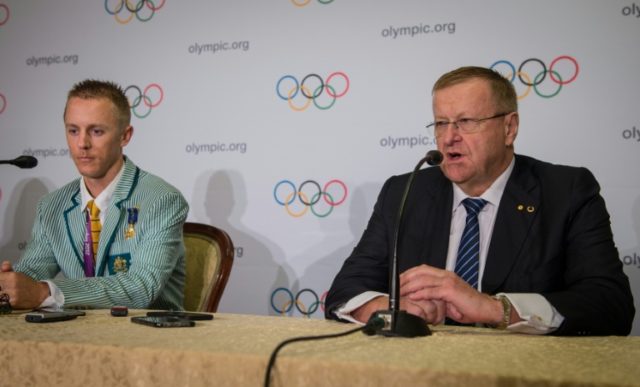Melbourne (AFP) – Russia’s anti-doping agency and athletics body “were rotten to the core”, IOC vice-president John Coates said Friday ahead of a decision on whether their track and field team can compete in Rio.
Coates slammed a “massive injustice” as he belatedly awarded a London 2012 Olympics gold medal to Australia’s Jared Tallent, who was promoted from silver after a Russian doping case.
The strong comments from the International Olympic Committee (IOC) vice-president come as athletics’ world body, the IAAF, prepares to decide whether to end Russia’s suspension ahead of the Brazil Olympics.
Russia’s track and field organisation was suspended in November over explosive doping and corruption allegations, which were compounded by a fresh bombshell report this week.
Among a string of Russian athletes to fail drugs tests was Sergey Kirdyapkin, who took 50km walk gold in London ahead of Tallent, only to be stripped of his title this year.
“Presenting an Olympic medal is always an honour,” Coates, who is also president of the Australian Olympic Committee, said at a ceremony in Melbourne.
“But more so on this occasion to be part of rectifying, in some way, the massive injustice perpetrated on Jared by a doping cheat and aided by a Russian Anti-Doping Agency and Russian Athletics Federation that were rotten to the core.”
The Court of Arbitration for Sport (CAS) ruled in March to strip six Russian track and field stars — including Kirdyapkin — of their titles and medals from a period ranging from 2009 to 2013.
The decision came after CAS upheld an appeal by world athletics body the IAAF, which had criticised Russia’s “selective” disqualification of these athletes’ results, accusing the country of annulling them only for minor competitions.
– ‘Nail in the coffin’ –
The IAAF suspended Russia in November after a World Anti-Doping Agency (WADA) special commission said there was state-sponsored doping and mass corruption in Russian athletics.
On Wednesday, a new WADA report said hundreds of attempts to carry out drug tests on Russian athletes this year have been thwarted.
Drug testers had faced intimidation and threats from armed Russian security forces, while athletes continued to evade doping control officers with a variety of techniques, the WADA report said.
As the IAAF decision looms, Athletics Australia chief Phil Jones said he would be stunned if the scandal-hit nation was allowed to compete in Brazil.
“I think it would be shocking (if Russia took part) given the WADA revelations (this week), and not only that but the systemic nature of the doping that was originally revealed by WADA,” he told the Australian Broadcasting Corporation.
“But I really do think this seems to be the nail in the coffin. I think when you’ve got athletes refusing to be tested, there are clearly implications just from that.”
With more details of systemic doping emerging, there have been calls for a centralised anti-doping system to replace the current series of local agencies, a move that Jones said made sense.
“I think the idea of a local agency testing their own athletes is simply not going to stand the test of time. We’ve seen with Russia, not only in athletics but in other sports,” he said.
“The challenge then becomes, if you’re having an international agency looking after the whole programme, the costs become enormous, exponentially higher than they are now.”

COMMENTS
Please let us know if you're having issues with commenting.